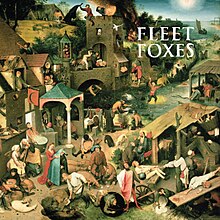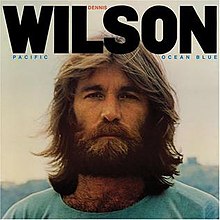On the one hand, several of my favourite bands came out with bad albums (I hate having to note them): The Resistance by Muse, Plastic Beach by Gorillaz, Nobody's Daughter by Hole, and (it really pains me to write this) Stone Temple Pilots by Stone Temple Pilots.
On the other hand, I did discover many great new bands and musicians, such as Danielson, Dr. Dog, Fleet Foxes, MGMT, Joanna Newsom, Secret Machines, Sufjan Stevens, and Zero 7.
But on the other other hand, there were a couple of my favourites who did release some good material. I am specifically referring to Black Gives Way to Blue by Alice in Chains and Backspacer by Pearl Jam. Neither made my Top Ten but they were still good albums that deserve mentioning, particularly in light of the bombs mentioned above.
Of course, I have yet to listen to The Age of Adz, by Sufjan Stevens and Write About Love by Belle and Sebastian. Both albums are from recent favourites and both have received rave reviews. I’ll let you know, probably in December of 2011.
Please note, I base my Top Ten Albums not on what was released a specific year but on the year I first listened to the album. Also, while I do have a Top Ten list, I do not number them from 1-10 or the reverse. That is far too much precision for me on this matter. Anyway, #1 would have been Want One.
Note last year’s list: The Top 50 Albums I Listened To This Year (which includes a Top Ten)
I’ve since added Top Ten choices Demon Days, Their Satanic Majesties Request, and Transformer to my Permanent Top 50 List. But I’ve also added Dear Catastrophe Waitress and Pink Flag from last year’s bottom 40 to the Permanent Top 50. It’s amazing how things like this work out.

Heroes to Zeros, The Beta Band (2004)
Here is the last album of now defunct group, an album that I really like. I’ve already started keeping my eyes open for their previous albums.

Ships, Danielson (2006)
This is probably the best “Christian album” I’ve ever heard. (Does one count U2 albums as Christian? If so, it’s better that the overrated Joshua Tree but almost as good as the underrated Achtung Baby [Don’t get me wrong; I really like Joshua Tree. I’m actually listening to it as I write this sentence. ‘Where the Trees Have No Name …!”]). But I digress.
This really is a fantastic album! Unique, ambitious, witty, conceptual, and, yes, the songs are great. And this is probably why no one in American Evangelical Christendom hears of them.
Let me put it this way: this is the closest American Evangelicalism has ever gotten to having their own version of Sgt. Pepper’s, Dark Side of the Moon, and OK Computer.
When one is having to slum through several generations of musical banality and mediocrity, anything exhibiting some form of originality is welcome with open arms and open ears. But this album is gob-smacking fantastic!
Yes, Danielson is so good that he should not be referred to as a Christian musician but as a musician who is a Christian. If you don’t understand the difference then you don’t understand the problem.

Fate, Dr. Dog (2008)
I really love this album. This is what new bands should sound like. Can you conceive in your mind the collective musical sound of The Beatles on their album, Abbey Road? That’s what Dr. Dog sounds like!

Fleet Foxes, Fleet Foxes (2008)
This is really a perfect album. Every song is great; I never skip. And very few albums end as beautifully as this. Yes, critics have been raving about this album but (and this is the point) this time the critics are right. Even The Guardian claimed this album to be "a landmark in American music, an instant classic".
I pretty much can guarantee that their next album will be the most highly anticipated sophomore album of 2011.

The Milk-Eyed Mender, Joanna Newsom (2004)
A fantastic album! Here is a Great Song-writer (very Harry Nilsson) with quirky, semi-Beck-like lyrics and a quirky voice ... and she plays the harp.
Yes, Joanna Newsom plays the harp. I never would have thought I would - not just like, but – love an album of a harpist. Granted, the entire album isn’t just a harp; there are keyboards, violins, etc. accompanying the harp and some songs without a harp at all. But she plays the harp so well that it’s simply wonderful to hear her play it.
A musician friend of mine in Boston had mentioned her to me but it took me four of five years to finally listen to one of her albums. Such wasted years.
The accolades for this album have been tremendous. This really is superb and COMPLETELY original.
Check out the first three songs on the album (“Bridges and Balloons", "Sprout and the Bean", and "The Book of Right-On"), particularly the second.
Be warned: her voice is a little shocking at first, but one quickly gets used to it.
Yes, this ambitious lady is one to keep an eye on. Check out her sophomore effort, Ys.

Have One on Me, Joanna Newsom (2010)
Talk about ambition! I told you to keep an eye on Newsom.
Here is a TRIPLE album. Songs that are 6, 9, 11 minutes long (only 6 tracks on each disc). With long, cryptic lyrics. Again, played mostly on a harp. How in the world could this work? But it does!

Illinoise, Sufjan Stevens (2005)
Here is a great album by a highly ambitious (there is that word again) song-writer and musician. And he is a Christian!

Want One, Rufus Wainwright (2003)
In January I stated that if I had listened to this album prior to Jan 1st 2010, it would have been on my Top 10 List … and it still would have been! Nevertheless, I can now put this album on my Top Ten List. Yes, this is one of the best albums I’ve ever heard and it was immediately put on my permanent Top 50 List.

Pacific Ocean Blue, Dennis Wilson (1977)
Here is the only solo album released by Beach Boy Dennis Wilson. A really superb album! Granted, Brian Wilson is the great musical genius of the family (and one of the great American songwriters along with Gershwin, Dylan, and Beck) but Pacific Ocean Blue shows how a lot of hard work and careful attention can pay off handsomely. Unfortunately, due to drugs, alcohol, a wild life, and an accidental drowning, Dennis Wilson died before he could complete the follow-up album Bambu. Perhaps even more unfortunately, but Pacific Ocean Blue was virtually unavailable for 15 years due to ongoing disagreements over copyright ownership.
I always hate it when a musician dies or has his career cut short before reaching his or her ultimate potential (e.g. Nick Drake, Curt Cobain, Shannon Hoon, Bradley Nowell, Andrew Wood, Jeff Buckley, and Syd Barrett).
Regardless, Pacific Ocean Blue is a truly great album and deserves a good listening.

The Garden, Zero 7 (2006)
This is a beautiful album. Down-tempo, ambient, electronica. There is not much more I can saw about it than that because it really must be experienced in order to be so greatly appreciated. The vocals, the harmonies, the songwriting, the studio production – how could such a wonderful album be made in this day and age? Oh, wait! They’re British!
Honorable Mentions (with just a few comments about the first two)
Backspacer, Pearl Jam (2010)
As stated above, I was dismayed at the lackluster work of Muse, Gorillaz, Hole, and (alas) Stone Temple Pilots. Pearl Jam did not disappoint me, though it helped that my expectations were low. I actually believe that this is their best album since Vitalogy!
Black Gives Way to Blue, Alice in Chains (2010)
Alice in Chains did not disappoint me either. I do not think that this album rises to the heights that their albums of 90s did (how could it?), but it is still a good addition to their oeuvre and contains a few really good songs.
Blue Record, Baroness (2009)
Fold Your Hands Child, You Walk Like a Peasant, Belle and Sebastian (2000)
If You’re Feeling Sinister, Belle and Sebastian (1996)
Oracular Spectacular, MGMT (2007)
Rockpommel's Land, Grobschnitt (1977)
Sun Giant, Fleet Foxes ([EP] 2008)
Sweet Oblivion, Screaming Trees (1992)
Tanz der Lemminge, Amon Düül II (1971)
Ten Silver Drops, Secret Machines (2006)
Tiger Milk, Belle and Sebastian (1996)
Tio Bitar, Dungen (2007)
When It Falls, Zero 7 (2004)
Ys, Joanna Newsom (2006)
You know, I started writing this blog post back in October and I still couldn’t finish it by 1-1-2011. Eh, who cares ... ?
 "Thinking Eternally, Acting Locally." - Neal August
"Thinking Eternally, Acting Locally." - Neal August

